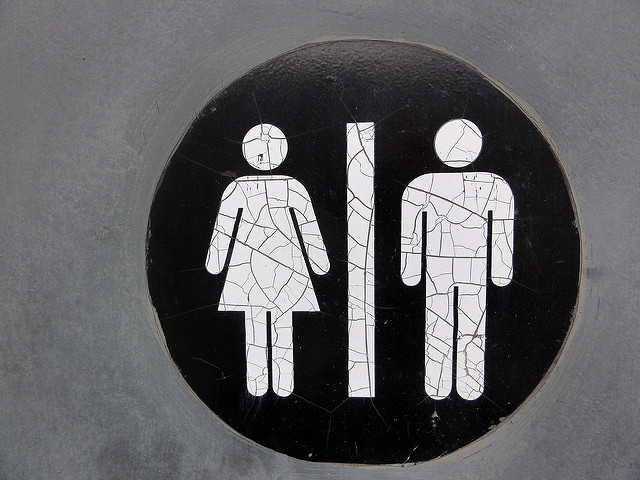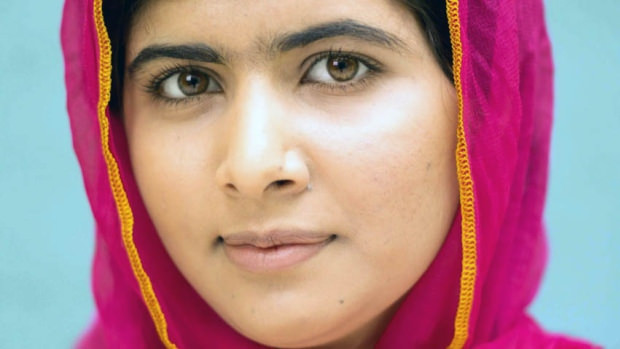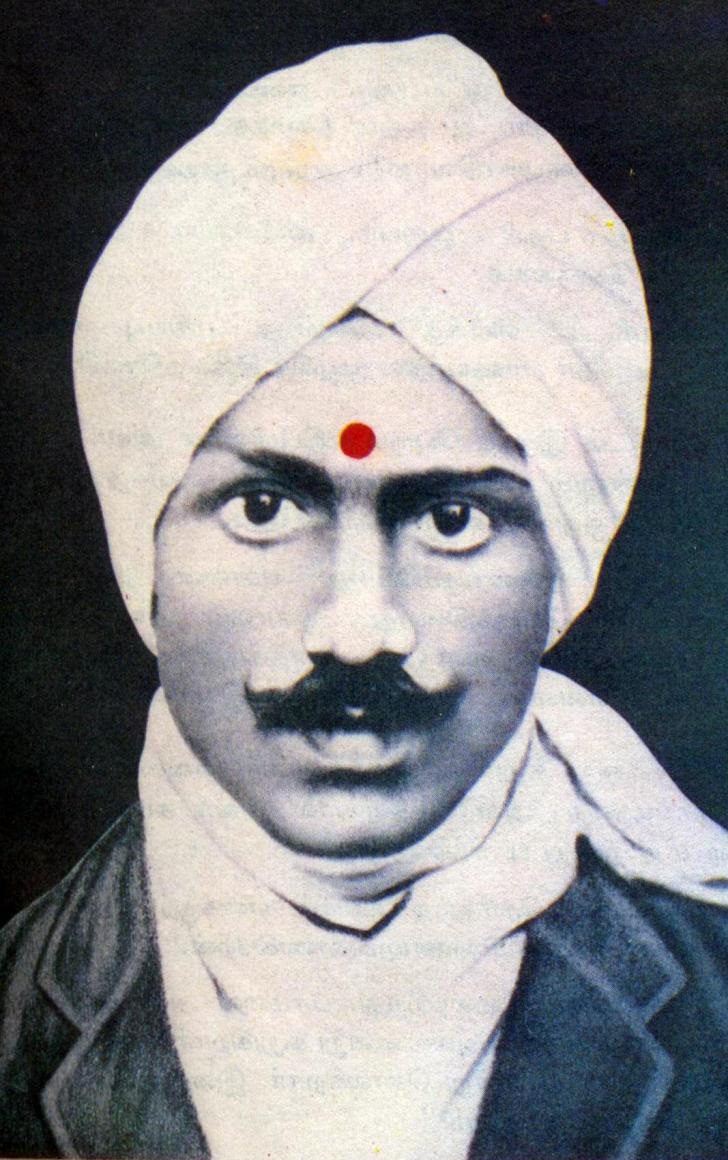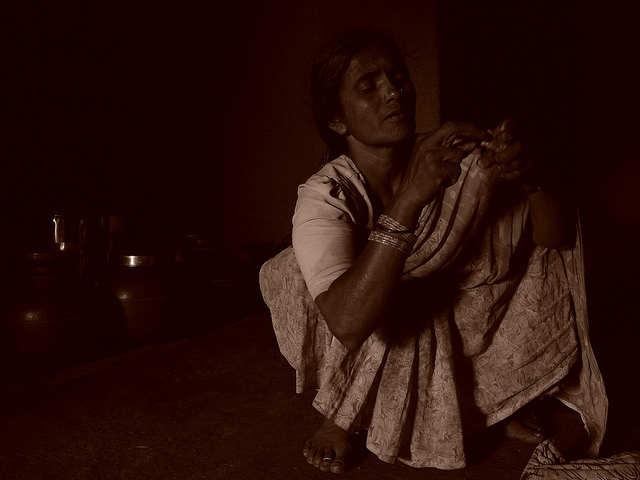
Her bruised blue eye was an "accident" she says. She fell down the stairs after the floors were freshly mopped. "Oh, I am an idiot" she adds with a hesitant smile. On one hand, she wants to maintain the harmony within the family, but also the harmony inside herself. So, she starts to justify the actions of her partner. If she dares to talk about it, the external support she seeks may not come.
He will change - give it some time.
When he beats her face for the 28th time because she has raised her voice against him, she still says, it was an "accident". "He makes up for it", she'll convince herself. So, the 28th time she receives a big bouquet of roses and the nightmare starts all over again.
Creating Awareness
This article is not a "we women have it so hard - please help us" piece or the texts of an "angry feminist" who lives in a men-hating fantasy world. It's about creating awareness around the societal injustices women still face, regardless of their ethnic background. It's not about blaming men, but about highlighting the socially constructed image and expectations of how women should live and behave - that women have no choice other than to follow their fate, that they should be the primary guardians of family values regardless of the sacrifices they may need to make, at the expense of their health and happiness, and so on. I am aware that even women can be against women's rights and equality. The opponents of progressive feminism are not men, but the people who do not want to acknowledge that a woman is more than a passive member of society.
The Main Issue
You may be familiar with the term "micro-aggression". It is a well known concept in socio-psychology describing little, but offensively formulated words, sentences or paragraphs with the aim to devalue someone who belongs to another group than the creator of the message. Men may feel offended by texts which describe the struggles of women because they view it as a personal attack on their character, and I can absolutely understand this. The art is to describe the problems in society without being micro-aggressive, but it also depends on how the male reader interprets the message.
I want to emphasize above all that feminism does not mean the oppression of men. Rather that women get access to the same rights and privileges. My view of feminism is not a fight against men, but against the social inequalities. Moreover, I want to highlight the areas in life where women are facing micro-aggression - a form of discrimination
The typical face of a feminist a lot of people have in mind is an overly-aggressive woman who rants against men, but feminism has several faces. Faces like the tamil writer Bharathiyar or the pakistani freedom activist Malala Yousafzai. They both fought for are fighting for what is still not widespread today.
Equal opportunities and the freedom of choice.


It is time to stop putting women into a feminist drawer and making them silent once their viewpoints don't fit the general definition of women's roles in society.
It's time to speak up.
International Women's Day
Today, March 8th, is an annual day dedicated to pursuing the equal rights of men and women. The day was started in 1909 in the US and soon the movement swept over Europe and had the aim to achieve equal rights for both sexes. Legally the equal treatment of men and women is established in Article 15 of the UN Women's convention. In countries such as Armenia, this special day is even recognized as a public holiday.
Although the origins date back to over 100 years ago and there has been much advancement in women's rights today, there is no country in the world that has proven equality of both sexes. It still seems to be difficult to gain an equal representation of women in every area of life. While women in the west are fighting for more quotes in leadership positions or the government, other parts of the world still fail to offer equal access to things like education and focus on empowering women.
Listen to our latest podcast 'Identity' hosted by Jeevan Ravindran!
- Shakthi / Theatre, Intergenerational Trauma and Australian Tamil Identity
- Identity Podcast: Anuk/ Language, Grief and Tamil Community
- Maral/ Art, Belonging & Armenian-Iraqi-Canadian Identity
- Identity Podcast: Shuba/ Music, Feminism and Dual Identities
The Portrayal of Women
As young girls, while we were playing with barbies, the boys were given remote-controlled cars. To stain the clean dress in the sandpit? Unthinkable for a girl. While the boy comes home with mud stains on his clothes, little girls are expected to be spotless. This is very stereotypical. Many women were raised with these ideas and expectations.

The differences between men and women are biologically predisposed. I believe that we, as women, are predetermined naturally to fulfill certain roles. However, what bothers me is that it seems sometimes as if it is a MUST to be like others wish us to be. What happens when we replace that MUST with a CAN?
Should we not give every woman the freedom to be who she wants to be?
Classical biological inequalities such as menstruation, pregnancy or the physique cannot be denied. However, a woman who is more focused on her career is quickly seen as "masculine". Why? Career is a personal choice and which birthright tells us to claim this privilege only for men?
A human being is more than his or her biological predisposition. They are a combination of biological, psychological and social aspects.
The Female Culprit
How often do we hear that a woman has to behave "right". For family problems, even a divorce, the woman is often seen as the reason behind the mistake.
Ava nalla aadakaari (she is a rebellious person)
But what does it mean that a woman has to behave "right"? I am not saying that everyone thinks this way, but our typical stigma towards women creates problems where there shouldn't be problems. Even in times like today, I often get the feeling that the woman is seen as an accessory to the man. According to the motto: "My house, my job, my wife" - a woman seems to be a checklist for some men, a possession. While men can enjoy their individuality, women are often put in a negative drawer as soon as they overstep an invisible border.
Another very important point to this discussion is that the image of masculinity is also changing for the better. Expressing emotions, for example, is still a taboo for men. This could result in men facing depression without proper support. As we fight gender norms forced on women, we also help men in the process. To say it in short: They get the chance to choose who they want to be and express their emotions as well as we women do.
Sexually Abused? Your Own Mistake
An extreme example, which I read in another article, is that the woman was being blamed for being raped. It is not only terrible that she has experienced this cruel act, but is seen as the culprit.
If you had worn something modest, this wouldn't have happened.
If you dress like that, you are asking for it.
Who will want to marry you now?
Sexual abuse has nothing to do with how women dress, but the inner attitude of the perpetrator. American photographer Katherine Cambareri proves this: she asked victims of sexual violence to send her the clothes the victims were wearing the moment when they were sexually abused and photographed the received items. She quickly proved that there was a wide range of clothes - from jogging pants to a flowered top. Her message:
Do not judge lightly the reasons for such a cruel act.
Click here for the original article and the photo gallery.
A recent example are the allegations of sexual abuse against celebrities through the MeToo movement. Comments like "they want to destroy the man's career" or "they only want attention" are not uncommon. This may be one of the reasons why victims of sexual abuse are looking for the mistake in their own behaviour instead of placing the blame where it belongs - the perpetrator.
Could I have do something differently? Did I have the chance to avoid this situation? Did I provoke it?
These are the types of questions going through the head of a young girl or woman. Ashamed, they may choose to say nothing at all, afraid of how others may judge them. This phenomenon has a name - "victim blaming".
Domestic Violence? Your Own Fault
As a pediatric nurse, I have witnessed many sad stories. Men who are irascible, radiate a violent aura and it's not uncommon for their wives or girlfriends to live in fear and not speak up. If the victim of domestic violence finds the courage and looks for help in a women's house or submits a divorce, she is labeled an "Aadakaari" (rebellious person), who has become short-tempered towards her husband and is subjected to dangerous comments like this:
If she talks like a man, she's asking to be beaten like a man.
It is not only worrying that people judge the woman as soon as the harmony in a family is broken, but she may also convince herself that she is at fault because of how society expects women to honour family values regardless of the cost.
Sadly, it is not surprising that an EU-study from 2014 shows that only 16% of the physical or sexual abuse against women are reported to police. According to the national crime office of lower Saxony (Germany), police were only aware of 7% of the cases. A lot of the concerned women are ashamed and try to keep what happened a secret. Moreover, they fear their own reputation and the reputation of their children. It shouldn't be neglected that men also suffer from an increasing number of cases concerning domestic violence. In the year 2014 3% in lower Saxony went through severe physical abuse, whereas the number for women is at 8%.
The Division of Roles at Home
Years ago, I heard an interesting podcast in English. Unfortunately, I already forgot the name of the speaker but the content stayed with me. A man talked about how the roles at home should be shared. It will naturally vary by couples, but for himself, he described his wife as a calming-down-point, but also as someone who has her own dreams and goals. The central point in his speech was:
It's also in the hands of a man how happy and balanced his home is.
He argued that although a woman has her role in the family, it is up to a man to recognize this and appreciate her and vice versa- it is a reciprocal relationship and a lot of people tend to forget this small, but very important point. A man who doesn't value his wife or even mistreats her, contributes a big part to the fact that the harmony of the family breaks - if a traditional family life is something you seek and value.
It is time to stop pointing fingers at the woman as soon as she is being abused or leaves an unhappy marriage.
The Modern Movement of Feminism
Feminism today is partially seen as a negative movement because the methods used to gain attention in the last few years were mostly aggressive. I do not totally agree with all areas of this movement. As with most things, it's up to us to adopt values and beliefs based on our own experiences and understanding. But we shouldn't forget that feminism is also a means to offer women the equal opportunity to education or protect them from being sexually abused. How much "feminism" we want to have in our everyday life depends on what's important to us.
Feminism at it's core has good intentions. To say it in short: Feminism aims to give women the freedom to choose the path she wants and eliminate the oppression by a system, that dictates how she has to be.
Definition of a feminist
Women who fight for their rights and equality are often seen as "naughty" or "too modern" or even as someone who wants to destroy the culture and what our parents are trying to teach us. They like to drink, party and do everything that is against our cultural standards. But feminism is not a series of contradictory behaviour, more a way of thinking - an attitude. The support of letting a woman decide for herself when she gets married or the career she chooses or the lifestyle she follows.
A liberation from the rules, which dictate to her how she has to live.
And a feminist has many faces. Feminism is not "western bullshit", feminine or dependent on a person's race. It could be a well integrated man or woman or even my aunt from Sri Lanka (which has a different cultural influence than what I'm used to), but nevertheless a common belief in gender equality.

Victim Blaming on a New Level
What bothers me in particular is a new form of "victim blaming". Feminist women are seen as the reason for the increasing divorce rates, the broken families and the collapse of social structures. When the reality is, women finally have the increasing means to leave situations which they shouldn't tolerate, like abuse. Why would a woman leave a man who is treating her well?
Why do people fear the freedom of women? Are they scared that they have to redefine social standards which gave them an upper hand all these years? That they may lose the privileges to benefit from the inequalities?
Divorce rates are rising, that's right. But feminism is not about encouraging a woman to throw everything away as soon as she is dissatisfied. It is more about empowering women with the freedom to decide against a relationship or marriage when they are mistreated. In short: Teaching them that they have a choice and this choice is not limited by a toxic marriage. The same applies to the man. Every type of relationship requires mutual investment and sustained enthusiasm.
Individuality and Freedom to Add Value
Women in the same job position are getting paid less than the men. In addition, it is still seen as natural, that a woman puts her career on hold once kids are in the picture. Classic roles are still widespread. I am aware that there are even some women who reject the equality of men and women in all areas of life. I personally think that a woman should play a bigger role in the first years of having children, but that doesn't mean all women should have to think this way.
How a woman wants to fulfill her role depends on her - and not society. Women's freedom shouldn't be limited by their environment. I think we can profit as a society from equality, because regardless the gender, people can enrich society with their talents.
We should empower women to have the freedom to choose and not subordinate to what's offered to them by society.
The society - which includes women and men - should give every woman the chance to get the best out of her and let her escape from what harms her. What we should never forget is that we are all a part of society and change starts within ourselves. Instead of relying solely on women to improve these types of social problems, we should work together and create awareness and aim for the betterment of all.
You can find the original german version of this article on my blog.
Want to read more articles about personal development, growing up between two cultures and mental health? Visit https://thecultureofgrowth.com/ and follow my blog on instagram and facebook.
You can also follow my profile on TamilCulture.com to get notified of my latest posts in real-time!
Date on your own terms! Join the other couples who have dated and married through myTamilDate.com. Join Here.

























